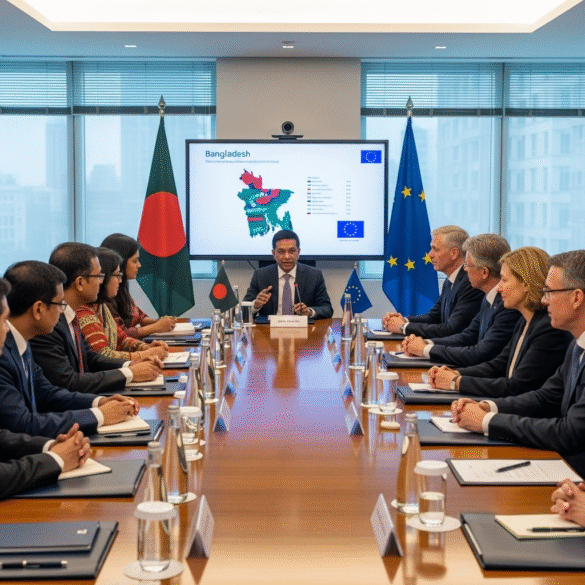Bangladesh is reaching out to the European Union for a free trade agreement in a bold move to keep its garment industry humming and to make sure factories can keep providing steady work and incomes for families across the country, and that clear goal is the hook: secure easy access to one of the biggest markets so clothes made here keep moving without extra hurdles. Leaders say this push comes as the country moves up from its least developed status, a change that could add new costs to exports but also opens a chance to build deeper, fair deals that help makers and small workshops grow. The commerce chief has already sent a note of interest to EU partners, starting talks that could set clearer rules on shipping, testing, and worker protections so that garments can reach shelves in Europe more smoothly. With the EU buying more than six out of every ten dollars of Bangladesh’s exports and annual export values topping over twenty-five billion, a full trade agreement feels like a practical next step to keep boats and trucks moving and to avoid new charges that could slow business. Nearby countries have shown how useful such deals can be—India and Vietnam have used similar pacts to steady their own industries—so Bangladesh hopes to combine its fast, skilled production with better market access abroad. The plan is to make rules simpler for yarn and fabric imports, speed up checks at ports, and help small factories meet standards so they can grow and hire more local workers. A direct deal with the EU could skip complicated steps and give easier benefits like lower barriers and clearer rules that help designers and factory managers plan with confidence. Other partners are already offering support: the UK has kept easy access for Bangladeshi goods, talks with Australia aim to relax local content limits, and discussions with Japan, South Korea, and Canada are all moving forward, while regional joining options could link Bangladesh more closely with its neighbors. So far the only small agreement in place is with Bhutan, but teams are working fast to expand the list so wins reach everyone from coastal mills to hilltop tailors. This outreach is more than paperwork; it is about steady paychecks that let families plan for the future and local shops that can grow into bigger businesses. By leaning into smart trade deals, improving ports and customs, and helping small makers meet rules, Bangladesh can keep its garment world bright and busy, turning new partnerships into steady work, wider chances for businesses, and pride that stretches from factory floors to shop windows.
Bangladesh Garment Industry Seeks EU Trade Pact for Stronger Exports
40


